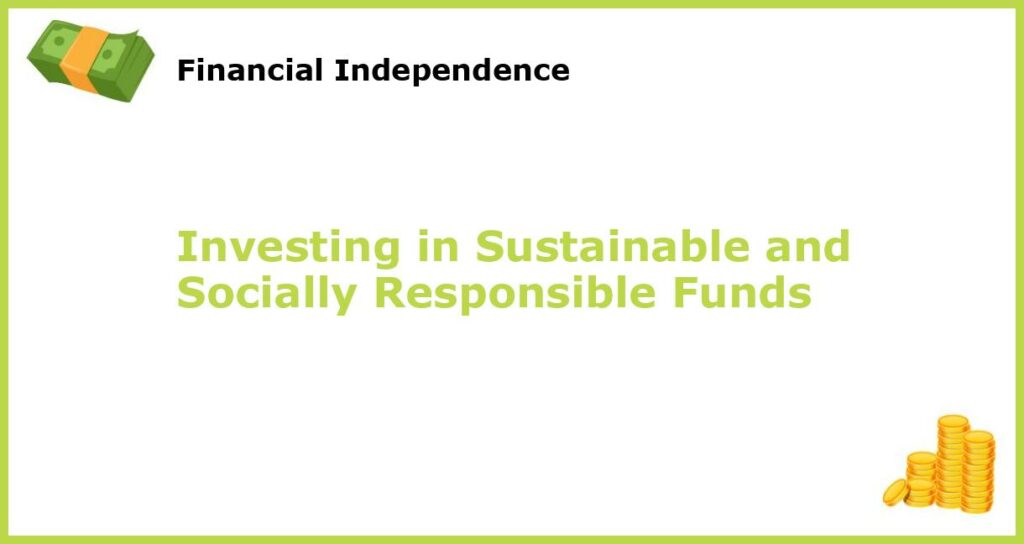Are you looking to invest in companies that prioritize making a positive impact on the world? If so, you might want to consider ESG investing. ESG stands for environmental, social, and governance, and investing in ESG funds means investing in companies that prioritize sustainable practices, social responsibility, and good governance. Keep reading to learn more about the rise of ESG investing, its benefits, risks, and how to choose the right ESG funds for you.
The Rise of ESG Investing
ESG investing has been gaining popularity in recent years as investors seek to align their values with their investment portfolios. Investors increasingly recognize that companies that prioritize ESG factors are often more sustainable and more resilient, which can lead to long-term growth and profitability. ESG factors can also help companies adapt to changing societal values and trends, making them better positioned to thrive in the long run.
Benefits of ESG Investing
Investing in ESG funds can offer many benefits to investors, such as generating strong returns while supporting socially responsible companies. Additionally, ESG funds can help diversify portfolios beyond traditional investments, potentially reducing risk. Furthermore, investing in companies that prioritize environmental sustainability, social responsibility, and good governance can help promote positive change in society by supporting companies that make a positive impact on the world.
Environmental Considerations
ESG investing that prioritizes environmental considerations is becoming increasingly attractive to socially responsible investors. Climate change is one of the greatest challenges facing the planet, and investors are increasingly aware of the impact the business community has on the environment. By investing in ESG funds that prioritize environmentally friendly practices, you can support those companies working to make a positive impact on the planet.
Social Considerations
Investing in companies that prioritize social responsibility is another key factor to consider when selecting ESG funds. This can include a range of ethical considerations such as labor standards, human rights, and community engagement. Just as consumer awareness around climate change has increased, so has awareness around social justice and equal opportunity. By investing in companies that prioritize social responsibility, you can help promote positive change in society.
Governance Considerations
Good governance should also be a critical factor when investing in ESG funds. This includes factors such as board independence, executive compensation, and shareholder rights. Companies that prioritize good governance are generally more transparent and accountable, which can lead to better outcomes for investors.
Adapting to Social Change
Companies that prioritize ESG factors will be better positioned to adapt to changing societal values. For example, as consumers become more aware of the impact that companies have on society, those companies that prioritize ESG factors will be better positioned to thrive in the long run. As a result, investing in ESG funds that prioritize these factors can be an intuitive way to align your values with your investment portfolio.
Risks of ESG Investing
Like all investments, ESG funds have risks, and investors should be aware of these before making any investments. One potential downside is that ESG funds may have higher fees than traditional funds. Additionally, ESG funds may be more volatile because they are generally invested in smaller companies that are less established. Lastly, there is no guarantee that ESG investments will generate returns.
Choosing ESG Funds
When considering ESG funds, it’s important to do your research and choose wisely. Look for funds that prioritize the factors that matter most to you, whether that be environmental sustainability, social responsibility, or good governance. Additionally, it’s important to consider the fees associated with each fund, as this can impact your overall returns. Lastly, be sure to understand the risks involved in any fund before making any investments.
Impact Investing
If you are looking to make an even greater impact, impact investing is another option to consider. This type of investing involves investing in companies designed to have a positive impact on society, such as those involved in renewable energy, sustainable agriculture, or affordable housing. Unlike ESG investing, which targets companies that prioritize ESG factors, impact investing specifically targets companies that have a positive social impact.
Takeaway
ESG investing can be an ideal way to support companies making a positive impact on the world while potentially generating strong returns. However, as with any investment, ESG investments come with risks, and investors need to do their research in choosing ESG funds that match their values and priorities. Regardless, ESG investing is an excellent way for individual investors to align their values with their investment portfolios and promote positive change in society.







